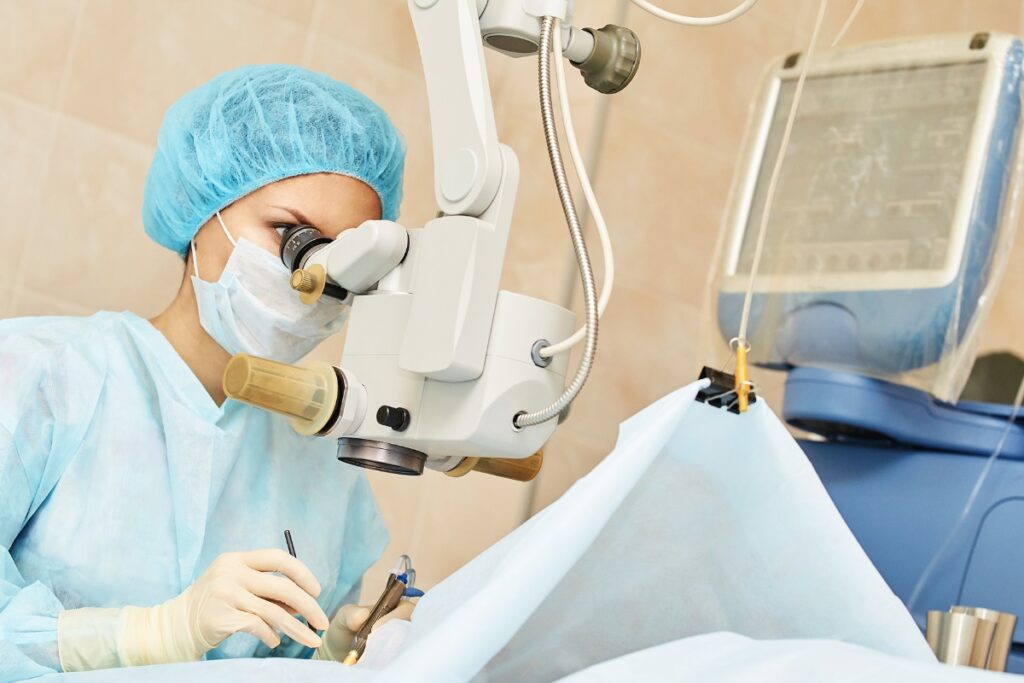
Laser eye surgery is one of the safest and most transformative medical procedures available, with over 99% success rates.
A year after undergoing PRK surgery, I can confidently say it was the best decision I’ve made.
Imagine waking up and seeing the world clearly—no glasses, no contacts, just crystal-clear vision.
In this blog, I’ll share my experience with the cost of laser eye surgery, the procedure, the recovery, and a detailed comparison of two common methods: PRK and LASIK.
If you’re considering correcting your vision, this guide will help you decide if laser eye surgery is right for you.
Is it safe to get laser eye surgery?
The first and most important questions are if the laser eye surgery is safe and can I lose my vision?
It is very safe, and no, you will not lose your sight!
Laser eye surgery is one of the safest and most effective medical procedures for improving vision.
With a success rate exceeding 99%, complications are rare, and the results can be truly life-changing.
Here is the study on the safety of laser eye surgery.
The fear that I could lose my sight was only because I was not very knowledgeable about the subject.
However, the more I read up on the procedure and spoke with two surgeon specialists who do this kind of vision correction on a daily basis, the more at ease I became about the prospect.
The thought of paying once and having my eyes fixed forever sounded absolutely ideal, so I did not give it much thought and just went ahead and did it.
It was an investment in better vision and a higher quality of life.
The Cost of Laser Eye Surgery
I live in Luxembourg and had my laser eye surgery here. Although it was pricey as I paid 3000 euros, I got reimbursed 2000 euros by my private insurance. About it below.
If you’re planning surgery but worrying about cost, check out My Tips to Save Money in an Expensive Country. (link to another post)
I could do it abroad a bit cheaper, but I knew that here I have my boyfriend, who will take care of me during my recovery period.
Also, it was more comfortable to recover in my own bed, in my own apartment, where I know how to get to the bathroom or to the kitchen with closed eyes.
This is very important, as after PRK surgery, the first 3 days are the worst, and I spent almost 24 hours with my eyes closed. So walking to the bathroom, I had an eye mask on, and I was blind walking, touching the walls.
Is laser eye surgery covered by insurance?
The national health care system in Luxembourg does not reimburse for the eye surgery, as this is a cosmetic treatment performed on your own will.
But it might depend on the country where you live, so if you’re considering this procedure, be sure to check with your insurance provider.
Many plans include partial or full reimbursement for laser eye surgery, making it a much more affordable option.
To my delight, my private life insurance, CMCM, reimbursed €2,000 of the expense, leaving me with just €1,000 to cover.
How does it feel to have laser eye surgery? The procedure.
Does it hurt during the laser eye surgery? A lot of people are asking me.
No, it doesn’t.
They will put numbing drops in your eyes fifteen minutes before surgery to make sure you do not feel a thing.
The whole surgery is quick and painless.
My left eye got laser treatment for only 3 seconds, and my right eye got laser treatment for 7 seconds.
You will be awake throughout the entire operation, and the surgeon will be accompanied by a few assistants.
Doctors will provide you with specific clothing to wear before the procedure.
After you make it into the operating room, they will have you lie down on the bed while they cover one eye and put a protective mask over your face.
The operated eye will be wide open with a special tool so that you don’t blink.
After that, the surgeon and their assistant will insert eye drops, remove a corneal flap, and announce that the laser is about to be used.
Then just 5 to 7 seconds laser on your eye, but you will only feel a slight burning smell and no pain.
After the laser treatment, the surgeon will apply a bandage lens, which will be removed a few days later.
Then, they will repeat the process with the second eye.
The technology is so advanced that it’s incredibly safe and precise.
Before I knew it, the procedure was over, and I was able to walk on my own from the operating room.
I was able to see my boyfriend clearly, and this was my appearance just one minute after surgery; I was completely pain-free. Simply, I was still in the anastesia.
At the end, a few minutes post-surgery, the surgeon will come to check on you to see if you are doing fine.
He will give you medical leave and instructions regarding the recovery.
It is essential that you buy eye drops before your surgery.
You should receive a prescription to buy eye drops before your procedure.
On the day of your surgery, you will need them 2 hours later.
27 85 85 62
Does laser eye surgery fix astigmatism?
Yes, it does.
In my case, I had -2 astigmatism, and that was fixed with the simple 7-second surgery.
It sounds like a dream, but it is real, and now I can see shapes without glasses or contact lenses.
If your astigmatism is bigger or not stable and still changing over the last 6 months, this might be a different story, but this is what your surgeon will tell you on your first consultation.
They will check your eyes and see if you are eligible for the laser eye surgery.
Does laser eye surgery last forever?
Yes, the laser eye surgery lasts forever.
Which means you don’t have to do it again in 10 or 20 years.
But your vision will start slowly getting worse with age, as a part of the natural aging process, not related to the surgery.
So if you are in your 20s and you will do now the laser eye surgery, you will still have like 30 years of good vision.
So it is still very worth it.
Why I Chose Laser Eye Surgery
My eyes had specific problems; one had -1.5 myopia and the other had -2 astigmatism.
This made it hard for me to see distant objects, which had an impact on my daily life.
Additionally, the TV subtitles were fuzzy, so I needed to wear glasses to see clearly.
Glasses were not a part of my daily life for 25 years.
I actually did not like wearing them because I had to clean them every day and remember to bring them to work. I also forgot to wear them while I was on vacation, which made it challenging for me to see far away.
I will always be grateful that I decided to have laser eye surgery. Now, I wake up with crystal-clear vision, free from the burden of corrective lenses.
PRK vs. LASIK: What’s the Difference?
When it comes to laser eye surgery, the two most common methods are PRK (Photorefractive Keratectomy) and LASIK (Laser-Assisted In Situ Keratomileusis). While both methods reshape the cornea to improve vision, they differ in how the cornea is accessed and treated.
LASIK: The Most Popular Option
- Procedure: In LASIK, the surgeon creates a thin flap on the cornea’s surface using a laser or a blade. The flap is lifted, and the underlying cornea is reshaped before the flap is replaced.
- Recovery: LASIK offers faster recovery times, with most people experiencing improved vision within 24 hours.
- Suitability: Ideal for those with moderate to high levels of nearsightedness, farsightedness, or astigmatism.
- Risks: There’s a small risk of flap complications, such as wrinkles or dislocation.
PRK: The Alternative for Specific Cases
- Procedure: In PRK, the outer layer of the cornea (epithelium) is removed entirely to access the underlying cornea. The cornea is then reshaped with laser, and the epithelium regenerates naturally over time.
- Recovery: Recovery takes longer than LASIK, typically 3–7 days for initial healing and a few weeks for full vision stabilization.
- Suitability: Recommended for people with thin corneas or dry eyes, as it avoids creating a flap.
- Risks: Temporary discomfort and slower recovery, but the procedure has a lower risk of flap-related issues.
Which Method is Right for You?
The choice between PRK and LASIK isn’t something you decide on your own. After a thorough consultation and eye examination, your surgeon will recommend the best method for your eyes.
Why I Had PRK Surgery
During my consultation, my surgeon explained that due to the thickness of my cornea, PRK was the safest and most effective option for me. While I initially leaned toward LASIK because of its faster recovery, I trusted the surgeon’s expertise.
PRK required more patience during recovery, but knowing it was the best choice for my long-term vision gave me peace of mind.
My Recovery Journey: What to Expect
Recovering from PRK was an experience in itself. Unlike LASIK, where you can resume most activities within a day or two, PRK requires more downtime. Here’s how my recovery unfolded:
Days 1: Few hours after the laser eye surgery
Once we entered the car, the burning pain in my eyes started, and also the light from outside was very disturbing.
Make sure to take some dark sunglasses or sleeping mask with you, so the trip back home won’t be that harsh.
At home I went straight to bed; my boyfriend put all the shutters in the entire apartment down, as my eyes were very light sensitive.
In bed I started to have a lot of water coming out of my eyes, so I needed to use many napkins to stop it.
Then the pain escalated, and it was burning my eyes like hell. I was thinking why I did that to myself, but after a few days when I could see well, I realised it was worth all the pain.
Days 1–3: Rest and Darkness
The first few days after surgery were the most challenging. My eyes were swollen and sensitive to light, making it difficult to keep them open for long periods. During this time, I relied heavily on my boyfriend, who took incredible care of me. He put the eye drops every two hours directly into my eyes; he cooked for me and kept all the shutters closed for 24 hours. As any light was hurting me badly.
What Helped Me Cope
- Podcasts and Audiobooks: Since I couldn’t see much, listening to engaging content was a lifesaver.
- Resting in a Dark Room: Keeping the room dark and avoiding screens helped ease discomfort.
- Eye Drops: Regularly applying prescribed drops kept my eyes hydrated and sped up the healing process.
Days 4–7: Gradual Improvement
By the fourth day, I could open my eyes for longer periods without discomfort. My vision started to stabilize, and the swelling gradually subsided.
Weeks 2–4: Clearer Vision
By the second week, I noticed significant improvements in my vision. I needed to wear sunglasses every time I was outside.
Small tasks became easier, and by the end of the month, my eyesight was as clear as ever—glasses-free for the first time in years!
Life After Laser Eye Surgery: Seeing the World Clearly
Nighttime dry eyes were the only problem I had in the year following laser eye surgery.
However, this was getting better over time, and your surgeon will likely prescribe some excellent eye drops that you can purchase at any pharmacy.
Today, my vision is crystal clear, and I can see the stars clearly.
Whether I’m driving, traveling, or simply watching a movie with subtitles, the freedom of clear vision has made every aspect of life more enjoyable.
Tips for a Smooth Recovery
- Follow your surgeon’s instructions: Stick to your prescribed eye drop schedule and attend all follow-up appointments.
- Prepare for Downtime: Plan for a week of minimal activity and prioritize rest.
- Stock Up on Comfort Items: Audiobooks, podcasts, and soft eye masks can make the recovery period more manageable.
- Have a Support System: Whether it’s a partner, friend, or family member, having someone to help during the first few days is invaluable.
Is Laser Eye Surgery Worth It?
For me, the answer is a resounding yes, and anyone considering laser eye surgery has my enthusiastic recommendation.
It has not only improved my vision but also my quality of life.
With just one payment, you can get your vision corrected for good.
Without hesitation, I would make this type of investment again.
Moreover, the data shows that laser eye surgery is an incredibly safe procedure.
Actually, the risk of vision problems due to contact lenses is five times higher than that of corrective surgery.
For that reason, you should definitely go ahead with refractive surgery if you are sick of putting on glasses or contacts every day.
Are you thinking about getting laser eye surgery? Share your questions or experiences in the comments below—I’d love to hear your story! 🌟



